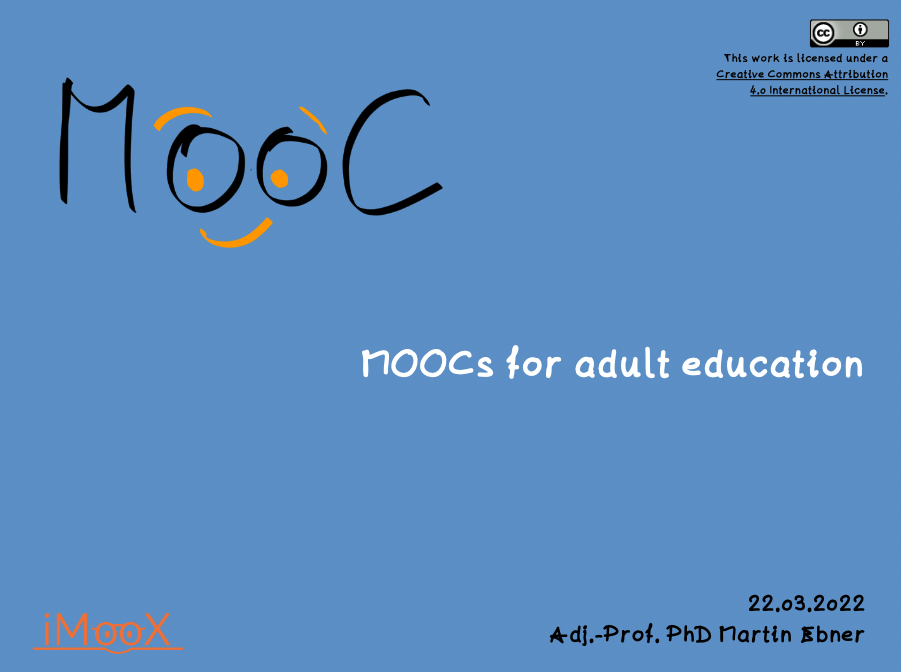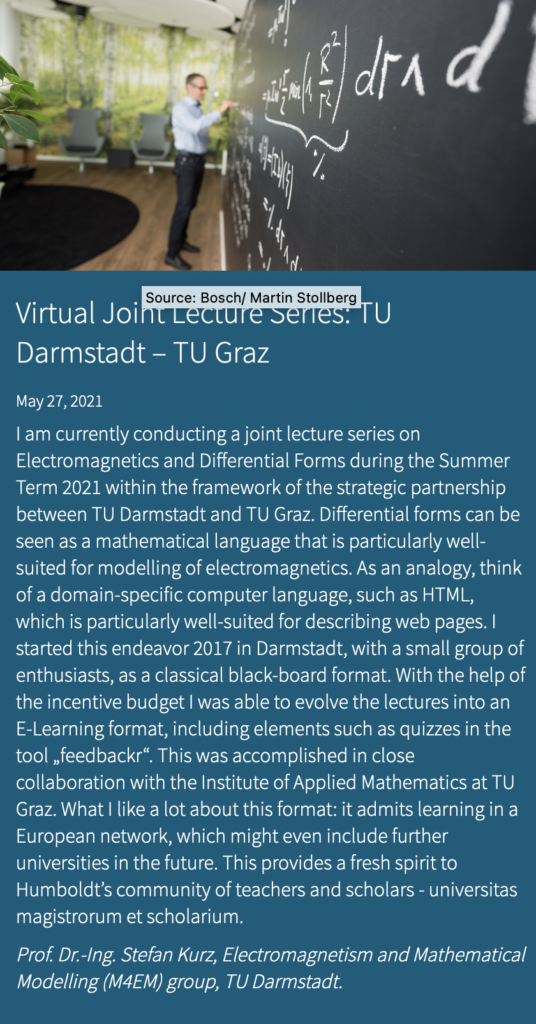For an Erasmus+ project meeting I did a presentation about „MOOCs for adult education“ and talked about iMooX.at and recent research work as well. Find the slides here:


Digitale Lehre an und rund um der Technischen Universität Graz
For an Erasmus+ project meeting I did a presentation about „MOOCs for adult education“ and talked about iMooX.at and recent research work as well. Find the slides here:

I would like to invite you to a Special Issue about „Innovative Technologies in Education“.
Dear Colleagues,
In the current situation of a worldwide pandemic, the use of digital technologies in education is not only a hot topic but simply a necessity. Due to the lockdown of schools and universities over an extended period of time, teachers had no alternative other than to use such technologies. On the one hand, we were able to see how education can work even in such a situation. On the other hand, we also witnessed the lack in skills needed to deliver high quality digital lectures.
Under these circumstances, we are today living in a world where teaching and learning are strongly influenced by technologies. For tomorrow, digital education can no longer be neglected. We must build upon these new circumstances to improve education as much as possible.
For this Special Issue, we are seeking contributions addressing the following research questions, but the list is by no means exhaustive:
– What is the influence of digital technologies on education?
– What are the future trends of innovative technologies in education?
– What are examples of how innovative technologies can be used in education?
– How can digital technologies contribute to high quality education?
Deadline for manuscript submissions: 31 October 2022.
Find here further details [Special Issue CallForPaper]
Es freut uns sehr, dass wir nun im Sommersemester 2021 nun erstmals eine „wirkliche“ virtuelle Lehrveranstaltung zwischen der TU Graz und der TU Darmstadt umsetzen konnten. Das bedeutet, dass die Lehrveranstaltung an der TU Graz stattfand mit einem Lehrenden von der TU Darmstadt und auch Studierenden von Darmstadt. Die Darmstädter Studierenden wurden dabei an der TU Graz eingeschrieben und bekommen auch von uns die Credits – kurzum ein virtuellles Auslandssemester 🙂
Wir hoffen, dass das Beispiel nun Schule macht und wir den Bologna-Prozess so weiter unterstützen können.

Martin Ebner und Sandra Schön haben in einer Lehrveranstaltung im Rahmen eines Studiengangs der PH OÖ versucht, OER nicht nur einzuführen, also z. B. warum es hilfreich ist, wo man es finden kann und was es mit den Lizenzen auf sich hat, sondern auch zu versuchen, OER direkt zu erstellen. In der fünfstündigen Online-Veranstaltung mit 32 Teilnehmer/innen an der PH OÖ haben Lehrkräfte aus berufsbildenden Schulen teilgenommen, die also schon ganz genau wissen, wie und welche Bildungsressourcen sie benötigen könnten. Nicht alle der Beiträge, die wir vorstellen werden, wurden tatsächlich innerhalb der 40-Minuten-Arbeitsphase erstellt, aber da es sich auch um den Arbeitsauftrag für die Lehrveranstaltung handelte, wurde daran dann weitergearbeitet. Als Impuls während der Weiterbildung hatten wir folgende drei Aufgaben bzw Links zur Verfügung gestellt:
Zwei Dinge die uns wichtig erschienen: OER wird noch mal konkreter, wenn man es macht. Man erlebt auch, dass es nicht soo schwer ist. Und wir hoffen, dass auch dieses Gefühl entsteht: Ich habe was gemacht, was andere brauchen können.
Optimal wäre es natürlich, wenn man alles noch in die passendern OER-Repositorien bzw. Referatorien einspeisen könnte, hier fehlen noch ausreichend Strukturen und auch Zeit. Aber das wird schon! 😀
Einschränkend der Hinweis: Die Materialien die nach einer so kurzen Einführung tatsächlich unproblematisch und OER bzw. direkt veröffentlicht werden konnten, waren in der Minderzahl. Zwar wurden überall z. B. detalliert auf Quellen hingewiesen und deren CC-Lizenz, aber dass sich dadurch auch die eigene Lizenz für das Gesamtwerk verändern könnte – ist einfach schwierig. Und dass das Bild für die Lizenz weniger wichtig ist (zumindest bei der SA-Gruppe) als die URL ist auch nicht ganz eingänging. Und einige der FlickR-Bilder waren zunächst nicht offen lizenziert. Für Trainer/innen bedeutet das, dass es auch noch einiges zum „Nachputzen“ gibt, was aber bei uns kein Problem ist, da diese Arbeit Teil der Lehrveranstaltung und Lehrauftrags ist. Abgesehen davon, dass es das wert ist, weil so tatsächlich OER entsteht!
Einige Ergebnisse der Teilnehmer/innen präsentieren wir hier, später dann weitere Beiträge. Auch weil wir es feiern, dass es so gelungen ist, den Pool an OER zu vergrößern!
Our conference contribution at last year Robotics in Education conference got published now titled „MAKER DAYS for Kids: Learnings from a Pop-up Makerspace„.
Abstract:
Makerspaces exist in different forms with different target groups and goals. Dedicated makerspaces are often organized as communities of practise. They provide space, devices, tools and materials for (digital) (re)production to support (social) innovation and to democratize STEAM education. The potential of makerspaces as authentic learning environments to teach 21st century skills is one reason why pop-up makerspaces are especially designed for children and teenagers, with a great focus on the tools and activities offered. The MAKER DAYS for kids are one example of a temporary makerspace for more than 100 participants with an open approach to encourage (especially female) participants to pursue a career in STEAM domains. Based on the gathered data of the last MAKER DAYS in 2018 and 2019 at Graz University of Technology, this publication focuses on the challenges in the design of maker activities in pop-up makerspaces and comments on the changes and improvements that were/are applied to the last/upcoming event.
[article @ publisher’s homepage]
[draft @ ResearchGate]
Cite this paper as: Grandl M., Ebner M., Schön S., Brünner B. (2021) MAKER DAYS for Kids: Learnings from a Pop-up Makerspace. In: Lepuschitz W., Merdan M., Koppensteiner G., Balogh R., Obdržálek D. (eds) Robotics in Education. RiE 2020. Advances in Intelligent Systems and Computing, vol 1316. Springer, Cham. https://doi.org/10.1007/978-3-030-67411-3_33
At this year EDMedia conference (online) we did a publication about „Practitioner Integration in Computational Thinking Education“.
Abstract:
This pilot study implemented an expert driven participatory workshop in a rural Austrian economic school. An action research approach was utilised to introduce the problem solving method named computational thinking (CT) to students aged 16 to 18 (K-12) in five after school workshop sessions. This research revealed the basic benefits of industry expert integration in a classroom setting with the aim to develop sustainable interdisciplinary interfaces that allow schools and individual teachers to independently showcase possible pathways. Drawbacks of the methods were identified, for example the high overhead efforts currently required without interfaces between practitioners and educators in place or the demanding time requirements. To create a strong, inclusive path to CT education for all young minds, these challenges need to be addressed and ultimately overcome with the support of all involved stakeholders.
Reference: Pollak, M. & Ebner, M. (2020). Practitioner Integration in Computational Thinking Education. In Proceedings of EdMedia + Innovate Learning (pp. 570-580). Online, The Netherlands: Association for the Advancement of Computing in Education (AACE). Retrieved July 14, 2020 from https://www.learntechlib.org/primary/p/217354/.
Our chapter about „Mixed Reality Books: Applying Augmented and Virtual Reality in Mining Engineering Education“ got published in the book „Augmented Reality in Education“.
Abstract:
Abstract Chapter
This chapter deals with the integration of Augmented and Virtual Reality (AR/VR) elements into academic mining education. The focus lies on the didactical approach within the EU-funded MiReBooks (Mixed Reality Books) project. The project aims to develop a series of AR- and VR-based interactive mining manuals as a new digital standard for higher education across European engineering education. By combining AR and VR technologies, it is possible to address current challenges in mining education in an innovative way. These virtual applications should make otherwise impossible and dangerous situations accessible to students. Classical paper-based teaching materials are enriched with AR content and translated into pedagogically and didactically coherent manuals for integrative use in the classroom. The authors explore how AR and VR instruments can be effectively integrated into teaching. The results of a broad evaluation of AR/VR-based lectures are presented and discussed in this chapter. The experiences and findings are summarized in a decision matrix for the use of AR/VR-based technologies in teaching.
[Chapter @ journal’s homepage]
[draft @ ResearchGate]
Reference: Daling, L., Kommetter, C., Abdelrazeq, A., Ebner, M. & Ebner, M. (2020) Mixed Reality Books: Applying Augmented and Virtual Reality in Mining Engineering Education. In: Augmented Reality in Education. Geroimenko, V. (Ed.). pp. 185-195. Springer, DOI: 10.1007/978-3-030-42156-4
The conference proceeding of this year „Robotics in Education“ is online now and we contributed with a chapter about the MakerDays for Kids.
Abstract:
The maker movement has become a driving force for the new industrial revolution, whereby all learners should have the opportunity to engage. Makerspaces exist in different forms with different names and a variety of specializations. The MAKER DAYS for kids are a temporary open makerspace setting for children and teenagers with the goal to democratize STEAM education and social innovation and to empower young learners, especially girls, to shape their world. This publication presents the setup and results of a temporary makerspace at Graz University of Technology with more than 100 participants in four days in summer 2018 and discusses the role of new technologies as a trigger of making in education. Moreover, the MAKER DAYS implemented an innovative evaluation concept to document the participants’ activities in open and unstructured learning environments.
[article @ publisher’s Homepage]
Reference: Grandl M., Ebner M., Strasser A. (2020) Setup of a Temporary Makerspace for Children at University: MAKER DAYS for Kids 2018. In: Merdan M., Lepuschitz W., Koppensteiner G., Balogh R., Obdržálek D. (eds) Robotics in Education. RiE 2019. Advances in Intelligent Systems and Computing, vol 1023. Springer, Cham
We would like to call for you contribution to a call for „Positioning Artificial Intelligence in Education –Evidence and Reflections„. We would like to do a special issue for the International Journal of Learning Analytics and Artificial Intelligence for Education (iJAI).
Due to recent technological advancements, artificial intelligence (AI) has received increased attention and has been adopted to many sectors and fields, thus, producing a profound impact. Given the rapid advancement of AI, it is expected that AI will continue to develop, integrate deeper and in many different sectors. Although the application of AI in the educational sector has been the subject of research for more than 30 years, a renewed and enforced interest in AI in education can be documented through the themes of scientific conferences, workshops and research papers, as well as how the Edtech industry is increasing efforts to integrate AI in educational applications. Indeed, this development is not unexpected considering that AI is associated with potentials of more personalized, adaptive and inclusive learning, and with empowered teachers and advanced learning environments. This Special Issue aims at highlighting contemporary research that covers AI in education. We are looking forward to receive both theoretical and empirical papers that provide readers with a better understanding of the theoretical discussions that are currently taking place, the empirical studies that are conducted, and the AI applications and systems that are developed
Submission of full paper: December 10, 2019
Find here the „Call for Paper“ with all details.
Im Rahmen der Interpädagogica in Graz haben Maria Grandl und Katharina Hohla einen Workshop zu „Ausgewählte Beispiele aus der Maker Education“ abgehalten. Hier sind die Folien zum Nachlesen:
Klicken Sie auf den unteren Button, um den Inhalt von www.slideshare.net zu laden.